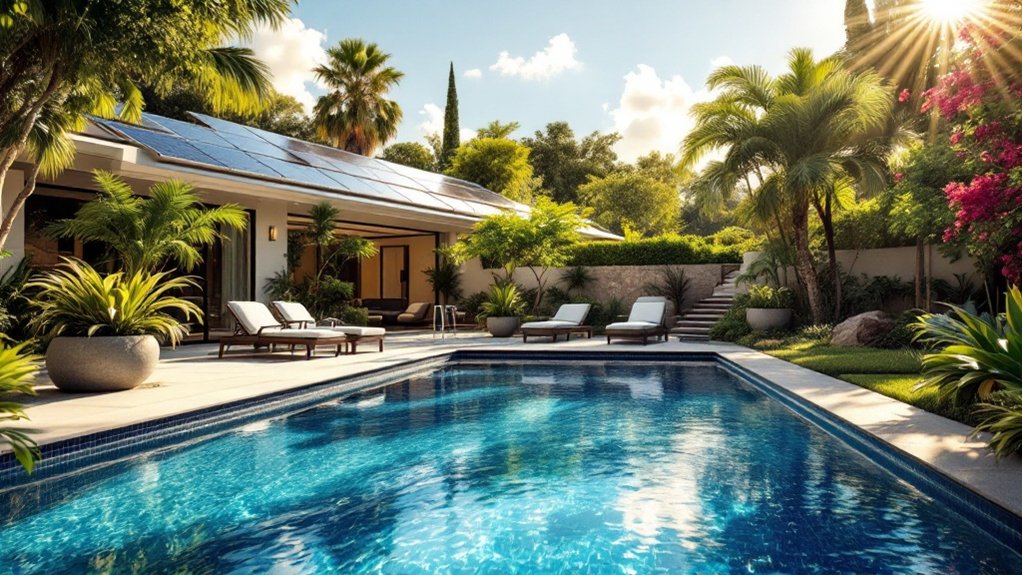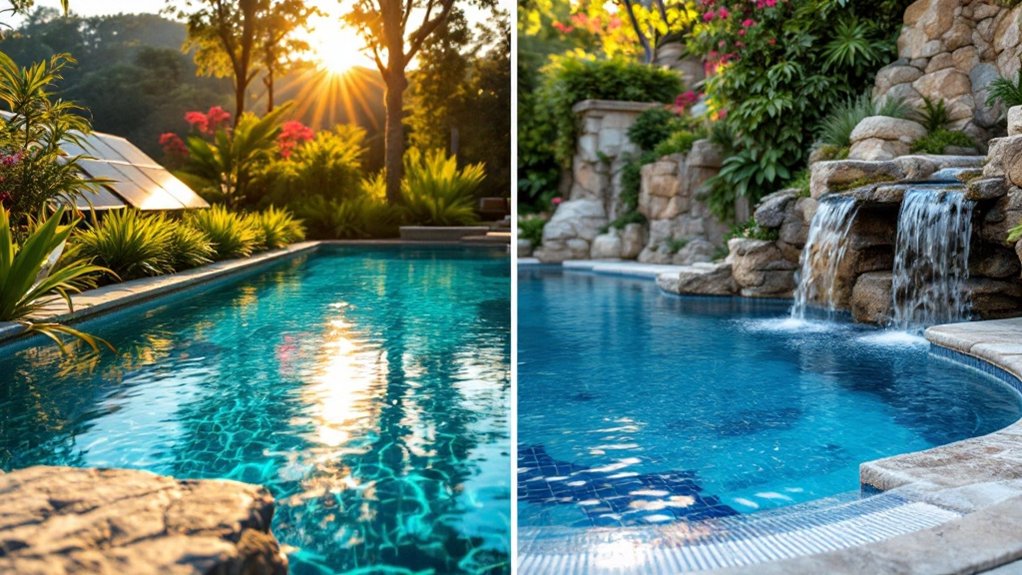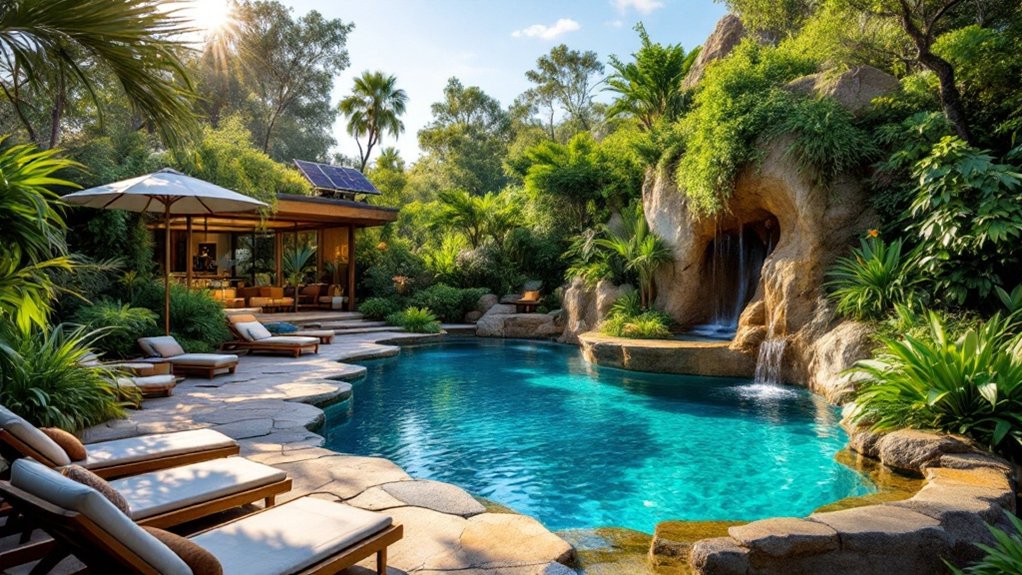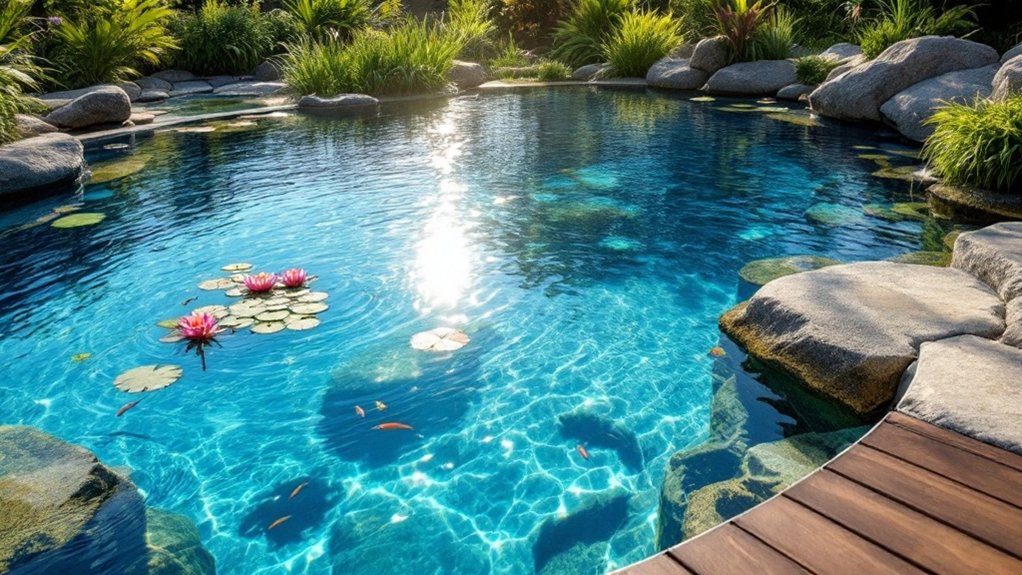Solar pool heaters represent a significant advancement in sustainable design. They combine functionality with modern aesthetics, catering to environmentally conscious homeowners. By harnessing solar energy, these systems not only heat pools but also minimize reliance on traditional energy sources. Their customizable designs allow for integration into various architectural styles. This innovation prompts a closer look at how solar technology can redefine outdoor spaces and impact overall sustainability. What implications does this have for future pool designs?
The Basics of Solar Pool Heating Systems
Although solar pool heating systems can vary in design and complexity, their fundamental purpose remains the same: to harness sunlight for warming pool water. These systems typically consist of solar collectors, which capture sunlight and convert it into heat, a pump to circulate the water, and a controller to manage the system’s operation. Solar collectors can be made from various materials, including glass and plastic, and are often mounted on rooftops or adjacent structures to maximize sun exposure. Water from the pool is pumped through the collectors, where it absorbs heat before returning to the pool. The efficiency of these systems depends on factors such as collector size, location, and the pool’s surface area, all contributing to the overall effectiveness of solar heating.
Benefits of Solar Pool Heaters for Homeowners
Solar pool heaters offer homeowners numerous advantages that extend beyond simply warming pool water. By harnessing the sun’s energy, these systems reduce reliance on traditional energy sources, leading to significant cost savings on utility bills. Additionally, solar pool heaters have low maintenance requirements, which can save homeowners both time and money over the system’s lifespan. They also contribute to a longer swimming season, enhancing outdoor enjoyment and increasing property value. Moreover, the installation of solar pool heaters can qualify homeowners for various incentives and rebates, making them an economically attractive investment. Overall, the benefits of solar pool heaters provide homeowners with an eco-friendly, efficient, and cost-effective solution for pool heating.
Environmental Impact of Traditional Pool Heating Methods
Traditional pool heating methods, such as gas and electric heaters, have significant environmental impacts that contrast sharply with the benefits of solar alternatives. Gas heaters emit greenhouse gases, contributing to climate change and air pollution. The extraction and combustion of fossil fuels further deplete natural resources and harm ecosystems. Electric heaters, while cleaner in operation, often rely on electricity generated from non-renewable sources, resulting in indirect emissions and environmental degradation from coal or natural gas plants. Additionally, both methods increase energy consumption, stressing power grids and leading to higher energy costs. The reliance on these traditional systems underscores the urgent need for sustainable heating options that minimize ecological footprints and promote environmental stewardship.
How Solar Pool Heaters Work
Solar pool heaters utilize the sun’s energy to warm the water in a swimming pool. This process begins with the absorption of solar energy by collectors, which then transfer heat to the circulating water. The efficient heat transfer mechanism guarantees that the pool maintains a comfortable temperature without relying on conventional energy sources.
Solar Energy Absorption
A solar pool heater operates by harnessing sunlight to warm the water in a swimming pool. The system consists of solar collectors, typically mounted on rooftops or nearby structures, which capture sunlight. These collectors are designed with a dark surface that efficiently absorbs solar radiation. As sunlight strikes the collector, it heats the fluid circulating through the system. This heated fluid is then directed to the pool, raising its temperature. The efficiency of solar energy absorption depends on various factors, including the angle of the collectors, the amount of sunlight, and the materials used in their construction. By utilizing this natural energy source, solar pool heaters provide an eco-friendly and cost-effective method for maintaining comfortable swimming temperatures year-round.
Heat Transfer Process
The heat transfer process in solar pool heaters is fundamental to their operation, utilizing the heated fluid generated by the solar collectors to warm the pool water. As sunlight strikes the solar panels, the collectors absorb this energy, heating the fluid—often water or a glycol solution—circulating through them. This heated fluid is then pumped into a heat exchanger or directly into the pool, transferring its warmth to the cooler pool water. As the pool water absorbs this heat, its temperature gradually increases. The process continues in a loop, with cooler water being drawn from the pool, heated, and returned. This efficient heat transfer allows solar pool heaters to maintain comfortable swimming temperatures, promoting sustainable energy use in pool maintenance.
Types of Solar Pool Heating Systems
Various types of solar pool heating systems cater to different needs and preferences, ensuring pool owners can find a suitable option. The most common systems include solar collectors, which capture sunlight and transfer heat to the pool water, and solar blankets, which reduce evaporation and retain heat. There are also active systems, utilizing pumps to circulate water through the collectors, and passive systems, which rely on natural circulation. Some systems are roof-mounted, integrating seamlessly with existing structures, while others are ground-mounted for larger installations. Additionally, hybrid systems combine solar heating with conventional methods for enhanced efficiency. Each type offers unique advantages, allowing users to choose based on factors such as climate, pool size, and budget.
Cost Savings and Return on Investment
When evaluating solar pool heaters, initial investment considerations play a vital role in decision-making. Over time, these systems can offer significant long-term savings and enhance energy efficiency, offsetting the upfront costs. Understanding the return on investment is essential for homeowners looking to maximize benefits while minimizing expenses.
Initial Investment Considerations
Investing in solar pool heaters presents a significant opportunity for long-term cost savings and enhanced property value. The initial investment for these systems can vary based on factors such as the size of the pool and the type of heater selected. While the upfront costs may seem substantial, potential buyers should consider the benefits of reduced energy bills and maintenance expenses over time. Additionally, many solar pool heaters are eligible for tax credits and incentives, further offsetting initial expenditures. Property owners may find that the enhanced appeal of a solar-heated pool can elevate their property’s market value. As a result, evaluating the initial costs in the context of these financial benefits is vital for informed decision-making.
Long-Term Savings Potential
The long-term savings potential of solar pool heaters is a significant factor for homeowners considering this investment. Over time, these systems can drastically reduce energy costs associated with heating pools, leading to substantial financial benefits. Unlike traditional gas or electric heaters, solar pool heaters utilize renewable energy from the sun, resulting in minimal operational expenses. Homeowners typically recoup their initial investment within a few years, depending on usage patterns and local energy prices. Additionally, lower maintenance costs contribute to increased savings, as solar systems generally require less upkeep than conventional heating options. Ultimately, the financial advantages of solar pool heaters promote not only economic sustainability but also enhance the overall value of the property.
Energy Efficiency Benefits
A considerable advantage of solar pool heaters lies in their energy efficiency, which translates directly into cost savings and a favorable return on investment. By harnessing the sun’s energy, these systems considerably reduce reliance on traditional heating methods, leading to lower utility bills. Homeowners often experience substantial savings over time, as solar heaters require minimal maintenance and have no fuel costs. In many cases, the initial investment is recovered within a few years, making these systems financially attractive. Additionally, the environmental benefits contribute to a growing demand for sustainable home improvements, further enhancing property value. Overall, solar pool heaters not only provide a sustainable heating solution but also deliver considerable economic advantages to their users.
Enhancing Outdoor Aesthetics With Solar Technology
Solar technology offers a unique opportunity to elevate outdoor aesthetics while providing functional benefits. Solar pool heaters, integrated seamlessly into landscape designs, can enhance the visual appeal of outdoor spaces. Their sleek, modern appearance complements various architectural styles, blending harmoniously with both traditional and contemporary settings. The choice of color and materials can be customized, ensuring that these systems not only serve a practical purpose but also contribute to the overall beauty of the environment. Additionally, strategically placed solar panels can create focal points, drawing attention to the pool area while maintaining an eco-friendly ethos. This synergy between functionality and design fosters an inviting atmosphere, encouraging outdoor enjoyment and promoting sustainable living.
Maintenance and Longevity of Solar Pool Heaters
Maintaining solar pool heaters is essential for ensuring their efficiency and lifespan. Regular cleaning practices and seasonal maintenance tips can greatly impact their performance. Understanding the factors that contribute to longevity will help pool owners maximize their investment. Additionally, regular inspections can help identify potential issues that may affect the heater’s performance before they become major problems.
Regular Cleaning Practices
Regular cleaning practices are essential for maximizing the efficiency and lifespan of solar pool heaters. Accumulated debris, such as leaves and dirt, can obstruct sunlight absorption, reducing heating effectiveness. It is advisable to inspect the solar panels regularly, clearing any obstructions to guarantee peak performance. Additionally, cleaning the panels with a soft brush and mild soap solution helps maintain their surface integrity, preventing buildup that could lead to corrosion or damage. Confirming that the circulating water is free from contaminants also contributes to the overall health of the system. By adhering to routine cleaning schedules, owners can greatly enhance the operational longevity of their solar pool heaters, ensuring they remain a reliable and sustainable heating solution for years to come.
Seasonal Maintenance Tips
While enjoying a warm, inviting pool is a priority for many homeowners, consistent seasonal maintenance is essential for ensuring the longevity and efficiency of solar pool heaters. Regularly inspecting the system for wear and tear can prevent costly repairs. Homeowners should clear debris from the solar collectors, ensuring unobstructed sunlight exposure. Checking the connections and hoses for leaks is crucial; any signs of deterioration should be addressed promptly. Additionally, flushing the system to remove sediment buildup can enhance performance. Before winter, it is advisable to drain the system to prevent freeze damage. By adhering to these seasonal maintenance tips, homeowners can maximize the benefits of their solar pool heaters, ensuring a sustainable and enjoyable swimming experience year after year.
Longevity Factors Explained
The longevity of solar pool heaters largely hinges on proper maintenance practices and environmental factors. Regular inspections and cleaning are essential to prevent debris buildup on panels, which can hinder efficiency and lead to premature wear. Additionally, ensuring that plumbing connections are secure and free from leaks contributes to the overall durability of the system. Environmental factors, such as UV exposure and temperature fluctuations, also play a significant role. Heaters installed in harsher climates may require more frequent maintenance than those in milder areas. Utilizing high-quality materials can further enhance longevity, as can protecting the system during off-seasons. Overall, a proactive approach to maintenance and consideration of environmental influences are key to maximizing the lifespan of solar pool heaters.
Integrating Solar Pool Heaters Into New Pool Designs
A growing number of homeowners are recognizing the advantages of integrating solar pool heaters into their new pool designs. By incorporating these systems during the construction phase, they can optimize energy efficiency and reduce long-term operational costs. Solar pool heaters utilize renewable energy, greatly lowering the carbon footprint associated with traditional heating methods. When designed with the pool’s layout in mind, these systems guarantee effective heat distribution and enhance overall aesthetics. Additionally, integrating solar technology allows for seamless compatibility with other sustainable features, such as energy-efficient pumps and filtration systems. As homeowners become more environmentally conscious, the demand for innovative and sustainable pool solutions continues to rise, making solar pool heaters an essential component of modern pool design. Furthermore, gas pool heaters provide an alternative heating source that ensures reliable warmth regardless of the outside temperature.
Future Trends in Sustainable Pool Heating Solutions
As homeowners increasingly embrace sustainable practices in pool design, future trends in pool heating solutions are poised to evolve markedly. Innovations in solar technology, such as advanced photovoltaic systems, are expected to enhance efficiency and reduce reliance on traditional energy sources. Additionally, the integration of smart technology will allow for real-time monitoring and optimization of heating systems, aligning energy use with peak solar availability. Moreover, the rise of hybrid systems combining solar, heat pumps, and traditional heaters will provide versatility and reliability. Sustainable materials and designs, such as thermal covers and heat-retaining surfaces, will further reduce energy consumption. Overall, these trends reflect a growing commitment to environmentally friendly and cost-effective solutions in the pool heating sector.
Frequently Asked Questions
Can Solar Pool Heaters Work in Cloudy Climates?
Solar pool heaters can indeed function in cloudy climates, although their efficiency may diminish. They still capture diffused sunlight, providing warmth to pools, making them a viable option for regions with less direct sunlight.
Are Solar Pool Heaters Compatible With Existing Pool Systems?
Solar pool heaters are typically compatible with existing pool systems. They can integrate seamlessly with traditional filtration and circulation setups, allowing homeowners to enjoy eco-friendly heating solutions without needing extensive modifications or complete system overhauls.
How Long Does It Take to Install a Solar Pool Heater?
The installation of a solar pool heater typically takes one to three days, depending on the complexity of the system and the existing pool infrastructure. Professional installation is recommended for ideal performance and safety.
What Warranties Are Typically Offered for Solar Pool Heaters?
Typically, solar pool heaters come with warranties ranging from 5 to 15 years. These warranties often cover defects in materials and workmanship, ensuring that consumers receive reliable performance from their investment in sustainable heating solutions.
Can I Install a Solar Pool Heater Myself?
Installing a solar pool heater independently is possible for those with basic DIY skills. However, it requires careful planning, understanding of plumbing, and adherence to safety regulations to guarantee maximum functionality and system longevity.
Conclusion
To sum up, solar pool heaters represent a significant advancement in sustainable design, offering homeowners an eco-friendly and aesthetically pleasing solution for pool heating. By harnessing renewable energy, these systems not only reduce carbon footprints but also enhance the overall appeal of outdoor spaces. As technology continues to evolve, the integration of solar pool heaters into both existing and new pool designs will further promote sustainable living, paving the way for a greener future in residential outdoor environments.




